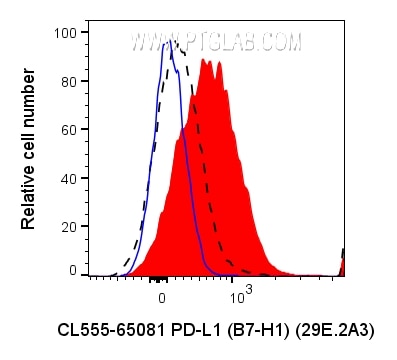Tested Applications
| Positive FC detected in | PHA treated human PBMCs |
Recommended dilution
| Application | Dilution |
|---|---|
| Flow Cytometry (FC) | FC : 5 ul per 10^6 cells in 100 μl suspension |
| This reagent has been pre-titrated and tested for flow cytometric analysis. The suggested use of this reagent is 5 ul per 10^6 cells in a 100 µl suspension or 5 ul per 100 µl of whole blood. | |
| Sample-dependent, Check data in validation data gallery. | |
Product Information
CL555-65081 targets PD-L1/CD274 in FC applications and shows reactivity with human samples.
| Tested Reactivity | human |
| Host / Isotype | Mouse / IgG2b, kappa |
| Class | Monoclonal |
| Type | Antibody |
| Immunogen |
Full length human PD-L1 Predict reactive species |
| Full Name | CD274 molecule |
| GenBank Accession Number | BC069381 |
| Gene Symbol | PD-L1 |
| Gene ID (NCBI) | 29126 |
| RRID | AB_3673410 |
| Conjugate | CoraLite® Plus 555 Fluorescent Dye |
| Excitation/Emission Maxima Wavelengths | 554 nm / 570 nm |
| Form | Liquid |
| Purification Method | Affinity purification |
| UNIPROT ID | Q9NZQ7 |
| Storage Buffer | PBS with 0.09% sodium azide and 0.5% BSA, pH 7.3. |
| Storage Conditions | Store at 2-8°C. Avoid exposure to light. Stable for one year after shipment. |
Background Information
Programmed cell death ligand 1 (PD-L1, CD274, or B7-H1), is the first member of B7 family to be discovered. B7 family molecules are type I transmembrane proteins belonging to the immunoglobulin superfamily. In concert with their CD28 family receptors, the B7s are key regulators of the adaptive immune response. PD-L1 is suggested as a negative regulator of T and B cell, and plays important role in mediating tolerance of lymphocytes to self-antigens. It is also involved in the costimulatory signal, essential for T-cell proliferation and production of IL10 and IFNG, in an IL2-dependent and a PD-1-independent manner.
Protocols
| Product Specific Protocols | |
|---|---|
| FC protocol for CL Plus 555 PD-L1/CD274 antibody CL555-65081 | Download protocol |
| Standard Protocols | |
|---|---|
| Click here to view our Standard Protocols |






